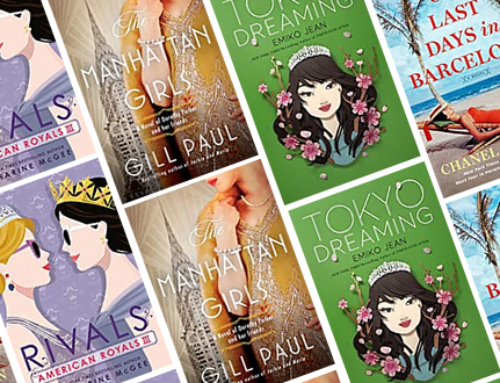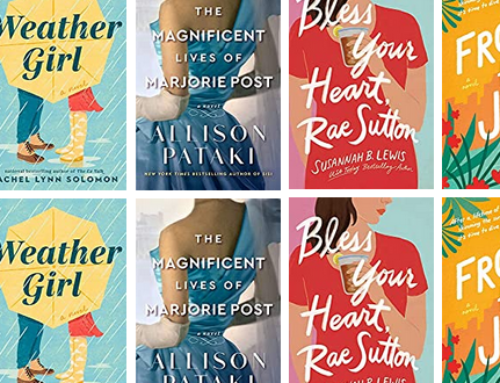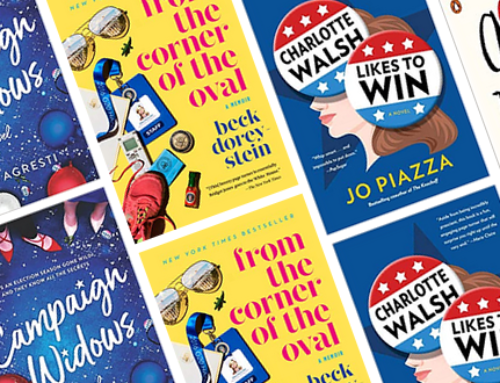Each month, with the Future Female Leaders book club, we get lost in a new book and a new world together. This August, we journeyed back over a century to the years just before World War I. We honed in on the lives of 3 women: Ida B Wells-Barnett, Maud Malone, and Alice Paul as they fought for women’s suffrage. Now that this month is coming to an end, though, your foray into history and the suffrage movement doesn’t have to come to a close! Check out these ten titles by similar authors, about similar subjects, or set in similar times to keep the magic alive.
Stories from Suffragette City by MJ Rose, Fiona Davis, et al
Stories from Suffragette City is a collection of short stories that all take place on a single day: October 23, 1915. It’s the day when tens of thousands of women marched up Fifth Avenue, demanding the right to vote in New York City. Thirteen of today’s bestselling authors have taken this moment as inspiration to raise the voices of history and breathe fresh life into their struggles and triumphs.The characters depicted here, some well-known, others unfamiliar, each inspire and reinvigorate the power of democracy. We follow a young woman who is swept up in the protests when all she expected was to come sell her apples in the city. We see Alva Vanderbilt as her white-gloved sensibility is transformed over the course of the single fateful day. Ida B. Wells battles for racial justice in the women’s suffrage movement so that every woman’s voice can be heard. Each story stands on its own, but together Stories From Suffragette City becomes a symphony, painting a portrait of a country looking for a fight and ever restless for progress and equality.
Why They Marched by Susan Ware
For far too long, the history of how American women won the right to vote has been told as the tale of a few iconic leaders, all white and native-born. But Susan Ware uncovered a much broader and more diverse story waiting to be told. Why They Marched is a tribute to the many women who worked tirelessly in communities across the nation, out of the spotlight, protesting, petitioning, and insisting on their right to full citizenship. Ware tells her story through the lives of 19 activists, most of whom have long been overlooked. We meet Mary Church Terrell, a multilingual African American woman; Rose Schneiderman, a labor activist building coalitions on New York’s Lower East Side; Claiborne Catlin, who toured the Massachusetts countryside on horseback to drum up support for the cause; Mary Johnston, an aristocratic novelist bucking the Southern ruling elite; Emmeline B. Wells, a Mormon woman in a polygamous marriage determined to make her voice heard; and others who helped harness a groundswell of popular support. We also see the many places where the suffrage movement unfolded – in church parlors, meeting rooms, and the halls of Congress, but also on college campuses and even at the top of Mount Rainier. Few corners of the United States were untouched by suffrage activism.
Resistance Women by Jennifer Chiaverini
After Wisconsin graduate student Mildred Fish marries brilliant German economist Arvid Harnack, she accompanies him to his German homeland, where a promising future awaits. In the thriving intellectual culture of 1930s Berlin, the newlyweds create a rich new life filled with love, friendships, and rewarding work—but the rise of a malevolent new political faction inexorably changes their fate.As Adolf Hitler and his Nazi Party wield violence and lies to seize power, Mildred, Arvid, and their friends resolve to resist. Mildred gathers intelligence for her American contacts, including Martha Dodd, the vivacious and very modern daughter of the US ambassador. Her German friends, aspiring author Greta Kuckoff and literature student Sara Weitz, risk their lives to collect information from journalists, military officers, and officials within the highest levels of the Nazi regime.For years, Mildred’s network stealthily fights to bring down the Third Reich from within. But when Nazi radio operatives detect an errant Russian signal, the Harnack resistance cell is exposed, with fatal consequences.
Sisters in Arms by Kaia Alderson
Grace Steele and Eliza Jones may be from completely different backgrounds, but when it comes to the army, specifically the Women’s Army Auxiliary Corps (WAAC), they are both starting from the same level. Not only will they be among the first class of female officers the army has even seen, they are also the first Black women allowed to serve. As these courageous women help to form the 6888th Central Postal Directory Battalion, they are dealing with more than just army bureaucracy—everyone is determined to see this experiment fail. For two northern women, learning to navigate their way through the segregated army may be tougher than boot camp. Grace and Eliza know that there is no room for error; they must be more perfect than everyone else. When they finally make it overseas, to England and then France, Grace and Eliza will at last be able to do their parts for the country they love, whatever the risk to themselves. Based on the true story of the 6888th Postal Battalion (the Six Triple Eight), Sisters in Arms explores the untold story of what life was like for the only all-Black, female U.S. battalion to be deployed overseas during World War II.
Mrs. Lincoln’s Dressmaker by Jennifer Chiaverini
In a life that spanned nearly a century and witnessed some of the most momentous events in American history, Elizabeth Hobbs Keckley was born a slave. A gifted seamstress, she earned her freedom by the skill of her needle, and won the friendship of First Lady Mary Todd Lincoln by her devotion.A sweeping historical novel, Mrs. Lincoln’s Dressmaker illuminates the extraordinary relationship the two women shared, beginning in the hallowed halls of the White House during the trials of the Civil War and enduring almost, but not quite, to the end of Mrs. Lincoln’s days.
The Women of Chateau Lafayette by Stephanie Dray
A founding mother…1774. Gently-bred noblewoman Adrienne Lafayette becomes her husband, the Marquis de Lafayette’s political partner in the fight for American independence. But when their idealism sparks revolution in France and the guillotine threatens everything she holds dear, Adrienne must renounce the complicated man she loves, or risk her life for a legacy that will inspire generations to come.
A daring visionary…1914. Glittering New York socialite Beatrice Chanler is a force of nature, daunted by nothing—not her humble beginnings, her crumbling marriage, or the outbreak of war. But after witnessing the devastation in France firsthand, Beatrice takes on the challenge of a lifetime: convincing America to fight for what’s right.
A reluctant resistor…1940. French school-teacher and aspiring artist Marthe Simone has an orphan’s self-reliance and wants nothing to do with war. But as the realities of Nazi occupation transform her life in the isolated castle where she came of age, she makes a discovery that calls into question who she is, and more importantly, who she is willing to become.
The Woman’s Hour by Elaine Weiss
Nashville, August 1920. Thirty-five states have ratified the Nineteenth Amendment, twelve have rejected or refused to vote, and one last state is needed. It all comes down to Tennessee, the moment of truth for the suffragists, after a seven-decade crusade. The opposing forces include politicians with careers at stake, liquor companies, railroad magnates, and a lot of racists who don’t want black women voting. And then there are the “Antis”–women who oppose their own enfranchisement, fearing suffrage will bring about the moral collapse of the nation. They all converge in a boiling hot summer for a vicious face-off replete with dirty tricks, betrayals and bribes, bigotry, Jack Daniel’s, and the Bible.Following a handful of remarkable women who led their respective forces into battle, along with appearances by Woodrow Wilson, Warren Harding, Frederick Douglass, and Eleanor Roosevelt, The Woman’s Hour is an inspiring story of activists winning their own freedom in one of the last campaigns forged in the shadow of the Civil War, and the beginning of the great twentieth-century battles for civil rights.
The Dictionary of Lost Words by Pip Williams
Esme is born into a world of words. Motherless and irrepressibly curious, she spends her childhood in the Scriptorium, a garden shed in Oxford where her father and a team of dedicated lexicographers are collecting words for the very first Oxford English Dictionary. Young Esme’s place is beneath the sorting table, unseen and unheard. One day a slip of paper containing the word bondmaid flutters beneath the table. She rescues the slip, and when she learns that the word means “slave girl,” she begins to collect other words that have been discarded or neglected by the dictionary men.
As she grows up, Esme realizes that words and meanings relating to women’s and common folks’ experiences often go unrecorded. And so she begins in earnest to search out words for her own dictionary: the Dictionary of Lost Words. To do so she must leave the sheltered world of the university and venture out to meet the people whose words will fill those pages.
History Smashers: Women’s Right to Vote by Kate Messner
In 1920, Susan B. Anthony passed a law that gave voting rights to women in the United States. RIGHT? WRONG! Susan B. Anthony wasn’t even alive when the Nineteenth Amendment was ratified. Plus, it takes a lot more than one person to amend the constitution. The truth is, it took millions of women to get that amendment into law. They marched! They picketed! They even went to jail. But in the end, it all came down to a letter from a state representative’s mom. No joke. Through illustrations, graphic panels, photographs, sidebars, and more, acclaimed author Kate Messner smashes history by exploring the little-known details behind the fight for women’s suffrage.
Ida: A Sword Among Lions by Paula J Giddings
From a thinker who Maya Angelou has praised for shining “a brilliant light on the lives of women left in the shadow of history,” comes the definitive biography of Ida B. Wells—crusading journalist and pioneer in the fight for women’s suffrage and against segregation and lynchings Ida B. Wells was born into slavery and raised in the Victorian age yet emerged—through her fierce political battles and progressive thinking—as the first “modern” black women in the nation’s history.Wells began her activist career when she tried to segregate a first-class railway car in Memphis. After being thrown bodily off the car, she wrote about the incident for black Baptist newspapers, thus beginning her career as a journalist. But her most abiding fight would be the one against lynching, a crime in which she saw all the themes she held most dear coalesce: sexuality, race, and the law.
Future Female Leaders is a participant in the Amazon Services LLC Associates Program, an affiliate advertising program designed to provide a means for us to earn fees by linking to Amazon.com and affiliated sites.












